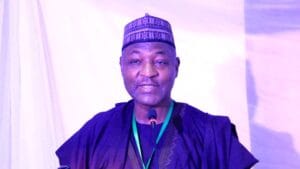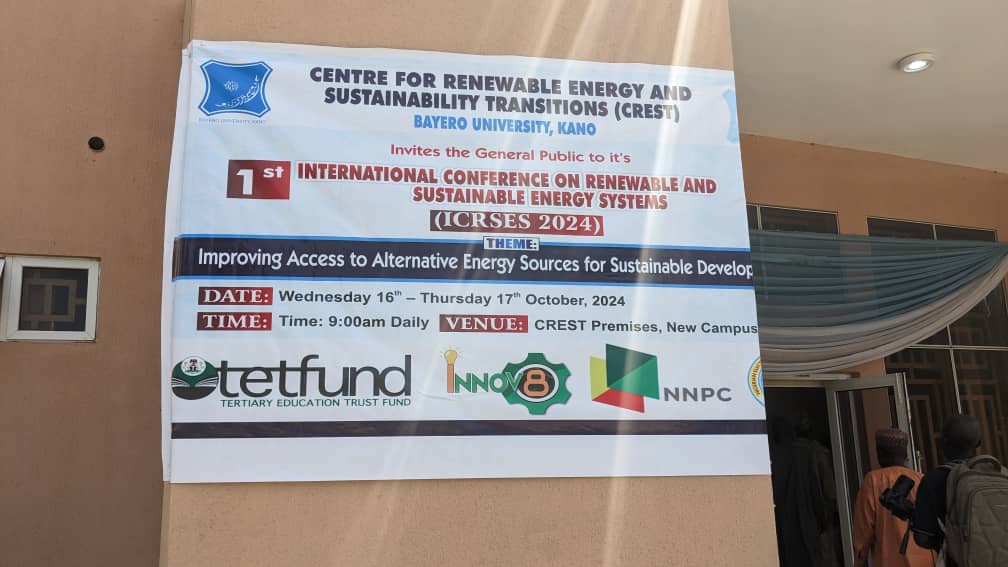Center for Renewable Energy and Sustainability Transitions, CREST, Bayero University Kano has held the first international conference on energy.
Tagged First International Conference on Renewable and Sustainable Energy Systems, ICRESES, held at the centre in BUK on Wednesday, the gathering received experts in the area, who discussed extensively on why alternative energy should be embraced.
Speaking at the event, the Director of the CREST, Professor Nasir Isa Fagge said the conference was aimed at building experts from all over the world to discuss the issue of energy, particularly renewable and alternative energy.
According to him, it is realized that the situation in Nigeria in particular, and other African countries is dire in the sense that they are not able to meet up with the global requirement of energy per capita.
“And with this problem, we thought it is important to bring experts so that we can discuss the issue of energy generation and production and Supply. So that we can begin to intervene effectively in the issue of addressing energy requirement for all which is part of the sustainable development goals of the United Nations.
“And in this regard, we are looking at particularly solar energy, which is considered to be zero carbon emitter and then we are also considering waste energy which is biomass. We are also looking at nuclear as an alternative source of energy, all these are considered as green sources of energy, which do not pollute the environment.
“Well like I said, this solar energy, the initial investment is high. But what we are doing is to promote banks and other enterprises to support people with the initial costs so that they can be paying gradually and that will help to address the initial cost problem.
“But if you notice if you install a solar system in your house, or in your industry. You are not expected to be expanding anything, more on it because it will sustain itself for the period of 10 15 to 20 years without you investing any further in it,” Prof. Fagge noted.
On waste management, the CREST director advocated for its usage through recycling to convert it to energy, which according to him is good for society’s economic and social benefits.
“Secondly, waste is a menace everywhere in Nigeria particularly Kano. We every day generate tons and tons of waste. This waste is hazardous and can cause a number of diseases, such as cholera in particular. We believe that waste can be turned to energy and it can be turned to wealth as well.
“So we are promoting the use of biodigesters that will enable conversion of waste to energy and that I think is the way out for Kano and Nigeria in general.
“We are also promoting nuclear because In most cases, you find that the industries rely more on heavy energy and in most cases, it is very costly to achieve that using either solar or biofoels So we are promoting nuclear energy because it’s considered as clean. And was installed it. It can also work for up to 20 years without the need for refund,” he said.
Earlier in his presentation, Professor Abubakar Sambo advocated for a paradigm shift from use of fossilfuel to renewable and alternative energy.
He noted that the use of cars, motorcycle, tricycles, aeroplane emit significant quantities of carbon dioxide which according to him “creates global temperature.
“The rose in temperature leads to climate change which will disrupt the agricultural situation. Rainfall will not come as we know it and therefore affect food production,” he said.
Professor Sambo, who is the President -elect of Nigerian Academy of Science, SAN, advocated for use of electric vehicles and other components of renewable and alternative energy to achieve even development in the country.
In his virtual presentation, Professor Kevin Nwaigwe of Clean Energy Research Center, CERC, University of Botswana stated that the goal of energy access is to provide environmentally sustainable, safe, reliable, and affordable energy for all.
“Universal energy access and the elimination of energy poverty are urgently needed for the growing world population,” he said
He explained that about 13% of the world’s population (approximately 940 million people) do not have access to electricity, adding that about 40% of the world (approximately 3 billion people) do not have access to environmentally sustainable fuel for cooking.
“In sub-Saharan Africa, only 82% of people have access to any form of electricity leaving about 18% of the population without access to electricity (UN, 2021).
“About 85% of those lacking access to electricity globally reside in rural areas with sub-Saharan Africa accounting for 75% of this population,” he said.
Earlier in a remark, the Vice Chancellor of BUK, Professor Adamu Sagir Abbas commended the Centre for organizing the conference which according to him, would go a long way in enlightening the people and those on power about the significance of renewable energy.
He urged the participants, which include students to use the knowledge they acquired at the conference and put it in practice.




